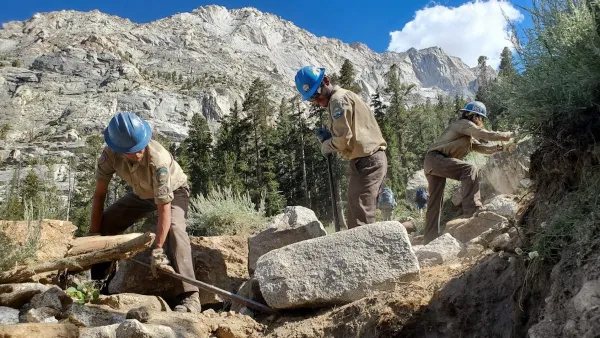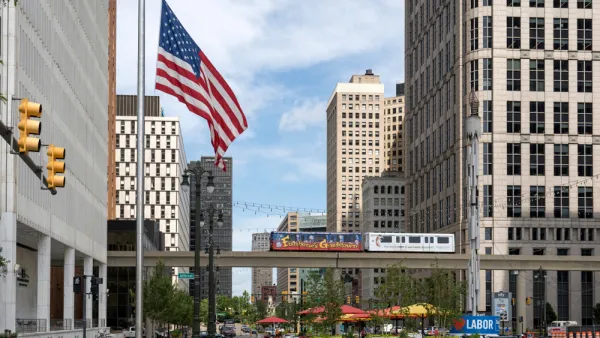Finding a first full-time “real” job in planning seems a daunting task at present. However, cities are growing, infrastructure is being funded, and there will be jobs for planners. The following tips can help one navigate the market. Be prepared to go to Kansas. By this I mean that there are certain places much loved by young planners—New York, Boston, San Francisco—and these are not the best places to start looking for early planning jobs. Sure they have them. For low pay. Where you’ll find yourself at the very bottom of the totem pole with years of photocopying ahead of you before you make it to the zoning counter.
Finding a first full-time "real" job in planning
seems a daunting task at present. However, cities are growing, infrastructure is being funded, and there
will be jobs for planners. The following tips can help one navigate the market.
Be prepared to go to Kansas. By this I
mean that there are certain places much loved by young planners-New York, Boston, San Francisco-and these
are not the best places to start looking for early planning jobs. Sure they
have them. For low pay. Where you'll find yourself at the very bottom of the
totem pole with years of photocopying ahead of you before you make it to the
zoning counter. If, however, you are prepared to move somewhere more out of the
way you can get terrific experience far faster and rise up the planning ranks. You can also make a difference in the lives of people who need planners more than the over-supplied planning markets. The
APA conference job fair is a good source for such jobs each year. Remember, you
don't have to stay in your first job, or even your first job location, forever.
Though you just might find you quite like Kansas.
Use your ordinary work
experience to get a leg up. I have recently had a stream of undergraduates
through my doors concerned that they won't be able to get the perfect, resume-building
internship in an exotic foreign country doing high level work. The good news is
that employers of entry-level plannners are typically looking for something much simpler. Combined with your planning coursework, a summer job
in a factory or on a farm may build those skills better than a "make work"
internship, no matter how high-powered the letterhead of the organization.
Employers for first real jobs want to know if you will turn up at work on time,
focus your attention on what you are being paid to do, show flexibility in what
you are willing to take on, demonstrate good judgment about how you spend your
day, get on with co-workers, share credit, learn from mistakes, and be basically honest. These might
not be evident in an internship where the supervision is loose and your work is
largely alone-you may be better off with paid work and some evidence of planning interest from your activism and coursework. For graduate students, work
in planning shows commitment to the field. Undergraduates, however, need to show they
have basic office skills and a job in the campus coffee shop can be a big
advantage in doing that.
Look to alumni
networks in related fields. Planning occurs in public, nonprofit, and
private settings. Many of the biggest private firms employing planners are
headed by folks from related fields such as engineering and architecture. You
may not think of the engineers on campus as your greatest allies but from
off-campus they may well see you as a fellow alumnus first. In big design schools, like mine, commercially successful
architecture alumni may have received insufficient recognition from their own home
departments; as a planner you can help them feel appreciated for their large
impact on the world.
Remember, a first job is just a starting point. Certainly as a planner you will hope to make the world a better place with everything you do but even the most high-powered planners start somewhere.
This is my February post delayed by illness. Upcoming posts
will look at the planning internships and planning careers more generally.

Analysis: Cybertruck Fatality Rate Far Exceeds That of Ford Pinto
The Tesla Cybertruck was recalled seven times last year.

National Parks Layoffs Will Cause Communities to Lose Billions
Thousands of essential park workers were laid off this week, just before the busy spring break season.

Retro-silient?: America’s First “Eco-burb,” The Woodlands Turns 50
A master-planned community north of Houston offers lessons on green infrastructure and resilient design, but falls short of its founder’s lofty affordability and walkability goals.

Test News Post 1
This is a summary

Analysis: Cybertruck Fatality Rate Far Exceeds That of Ford Pinto
The Tesla Cybertruck was recalled seven times last year.

Test News Headline 46
Test for the image on the front page.
Urban Design for Planners 1: Software Tools
This six-course series explores essential urban design concepts using open source software and equips planners with the tools they need to participate fully in the urban design process.
Planning for Universal Design
Learn the tools for implementing Universal Design in planning regulations.
EMC Planning Group, Inc.
Planetizen
Planetizen
Mpact (formerly Rail~Volution)
Great Falls Development Authority, Inc.
HUDs Office of Policy Development and Research
NYU Wagner Graduate School of Public Service





























